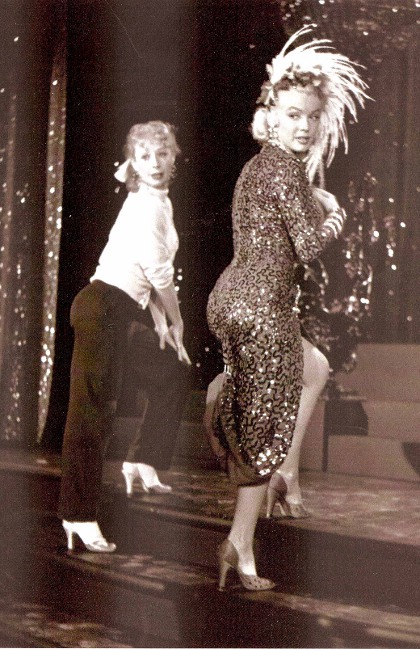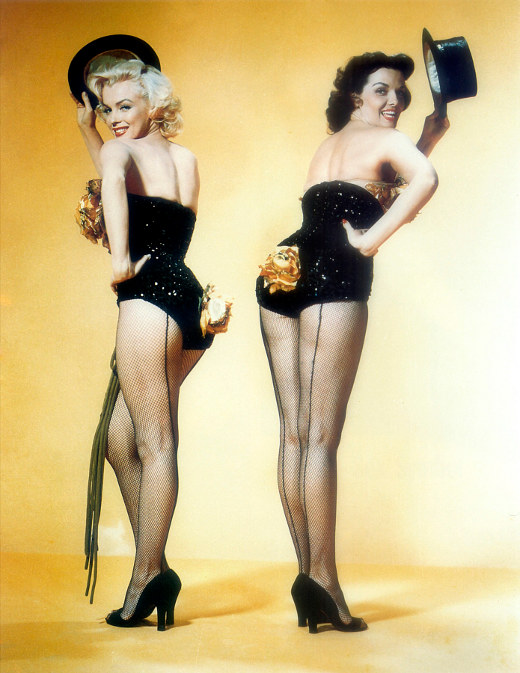
 “Yes,” answered Jane Russell last Wednesday evening, nodding emphatically when asked if choreographer Jack Cole had directed the dance sequences in Howard Hawks’s “Gentlemen Prefer Blondes” (1953).
“Yes,” answered Jane Russell last Wednesday evening, nodding emphatically when asked if choreographer Jack Cole had directed the dance sequences in Howard Hawks’s “Gentlemen Prefer Blondes” (1953).
Russell’s brown eyes flashed and she became animated on hearing Cole’s name.
The brunette bombshell of the 1940/50’s, appearing at a Hollywood Heritage event this past week, chatted with arts·meme ever so briefly about Cole, the great Broadway/nightclub/cinema dance maker who choreographed the three song-and-dance numbers of “Gentlemen.” Cole, a brilliant film and dance innovator who had a multi-picture relationship with Marilyn Monroe, died in Los Angeles in 1974.
“He [Cole] sat up on a big tall thing [camera dolly] running the whole thing … where the dancing was concerned,” Russell told me, indicating upward with her arm, and repeating, … “directing everything.”
This is not news; it’s been intimated in various written accounts over the years, but never reflected in the film’s credits.
 In his Hawks biography, “The Grey Fox of Hollywood,” Todd McCarthy quotes Gwen Verdon as saying that during the filming of Cole’s sparkling dance sequences [“Two Little Girls from Little Rock, “Ain’t There Anyone Here for Love,” “Diamonds are a Girl’s Best Friend”], Hawks was “not even on the set.”
In his Hawks biography, “The Grey Fox of Hollywood,” Todd McCarthy quotes Gwen Verdon as saying that during the filming of Cole’s sparkling dance sequences [“Two Little Girls from Little Rock, “Ain’t There Anyone Here for Love,” “Diamonds are a Girl’s Best Friend”], Hawks was “not even on the set.”
“Gentlemen” – an American masterpiece – was a huge step up for Jane Russell from the pulpy fare in which studio owner Howard Hughes packaged her at RKO, and she’s fantastic in the (Twentieth Century Fox) musical. Her eye-grabbing presence totally matches Monroe’s; her arch line delivery, impeccable.
Always a big-boned woman with a booming voice, Russell still radiates charming grit and drive. “I have a terrible time hearing and seeing … and with my brain!” she jovially told the Hollywood Heritage audience.
Cole and Verdon trained Russell and Monroe, both non-dancers (Jane famously said, “We were a couple of klutzes.”). By innumerable after-hours rehearsal sessions, the hard-working creative gals morphed into song-and-dance mavens.
Like this? Read more here:
- Culture Monster: The Man Behind Marilyn Monroe’s Moves
(includes video of “Diamonds”) - Los Angeles Times: Jack Cole Made Marilyn Monroe Move
- arts·meme: Marilyn Dances
- arts·meme: Girl Power

Jack Cole, at the very least, should’ve received co-director credit for “Gentlemen Prefer Blondes”. If you don’t have those iconic dance numbers then you don’t have much of a movie. Especially “Diamonds Are A Girl’s Best Friend” which is what really made Marilyn a star. Impossible to think of Marilyn Monroe without thinking of that musical number. Jack Cole was a genius and deserves to be more widely known.
How fortunate that you got to one of the living links to this amazing film.
I was first seduced by the power of GPB in 1962 as a kid in Chicago. It played on tv a few months before Monroe's death. Even on a black & white tv it jumped out. I remember the year so powerfully. My youngest sister was born that June. Six year-old me could not understand how the vivacious Lorelei Lee could kill herself by swollowing sleeping pills. While contemplating the wonder of a newborn sibling, it made absolutely no sense.
One of the things that drew me in to the movie besides Monroe is the scene in Paris where she and Russell sing "When Love Goes Wrong . . ." There were little black boys interacting with her in a way not possible in 1950s America. I didn't fully understand the implications of that scene in 1962. But as a little boy, somehow I knew that if this paragon of white America could interact with little kids of color as if it were nothing — I wanted to be in that universe.
Kevin, thank you for your fantastic observations. This film is FILLED with touchstones for so many populations. Feminists love the unusual portrayal of durable female friendship. The period from 1952 – 1956 was such a special moment in American culture; the U.S. was in full post-WWII flower and letting it rip culturally … expanding upon what it means to be American — American women in this case. I am fascinated by macho director Howard Hawks, the maker of great crime films and westerns, stretching into the musical genre with the truly subversive gay man, Jack Cole, as a key influencer.